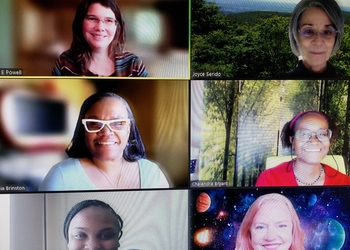
Families and Finance

Families and Finance: UROC research team investigates the link between historic trauma and financial strain.
Tonia Brinston was a single mom living paycheck to paycheck when a bank denied her request to open a checking account. Nobody told her why, they just said no. “I didn’t know anything about finances at that time, so I just accepted it and went on having to pay fees at check cashing places,” she recalls.
But Brinston was still determined to get out of debt and take control of her finances, so she entered Lutheran Social Services’ five-year Debt Management Plan program, created a budget and paid off her student loans and credit debt in 18 months. She also bought her first home. “I thought, ‘Oh my goodness, how many people in my family and community could benefit from this knowledge,’” she recalls.
And with that, Brinston decided she wanted to be a financial educator. After working at Lutheran Social Services for three years, she is now a full-time career coach and financial educator at Twin Cities Rise. She also runs her own company, SLAP (Sounds Like a Plan) Financial Consulting and is a sought-after leader of fun, interactive personal finance workshops.
One of her many current projects is being the community partner and co-principal investigator for “Voices of the Future: Linking Historical Trauma, Ambiguous Loss, and Financial Decision Making Among African American Families.” One of three research proposals chosen by a University/community selection committee to be awarded a UROC Research Agenda grant, the project’s goal is to improve the individual, family, and community financial well-being of African Americans living in North Minneapolis.
Grounded in strong community partnership, the project kicked off with the assembly of a Community-Led Advisory Group that is part of the research team. Next, about 20 families will be asked to participate in a multi-session financial education workshop focused on the association between historical trauma and economic well-being.
African Americans are blamed routinely for the financial disadvantages they experience. That’s why the workshop will counter that blame with facts about the ways in which Black people have been exploited and intentionally kept from building generational wealth by racist systems that have persisted for more than a century.
“Most Black people are aware of the systems, processes, policies and procedures that have been in place for generations, but some are not,” Brinston explains. “We talk about the lengths these powers have gone to keep us disadvantaged and how still, today, those practices are being utilized. That’s why it’s important to give people the tools, resources and language to move the needle and minimize the shame and stigma associated with personal debt.”
Chalandra Bryant, a Family Social Science Professor in the College of Education and Human Development, is also a co-principal investigator, along with Joyce Serido, Sharon Powell, and Mary Jo Katras. Working closely with Brinston and her fellow investigators, she hopes the project’s findings will offer a better understanding of how to improve family interactions and dynamics in the context of financial strain.
“Families are impacted by financial and social stressors,” Bryant explains. “What happens when parents feel they can’t provide for their children or ensure their safety and well-being? We want to help alleviate that stress, so people don’t feel so drained that they begin psychologically and emotionally withdrawing from their family members.”
Bryant notes that the project will examine economic deprivation from a trauma-informed perspective, which means exploring systemic barriers that have hindered African Americans’ ability to build wealth. It also means talking about the association between economic deprivation and ambiguous loss, a relational disorder that may occur as some parents psychologically withdraw from their families due to feelings of shame and helplessness given their perceived inability to adequately protect and provide.
In addition to helping families participating in the project understand how systemic racism has affected their current financial well-being, Brinston’s workshops will also equip people with information and tools so they can make better financial decisions going forward.
“We know that African Americans have a significant and positive impact on the economy, and yet there’s this myth that Black people are poor because of their spending habits or poor work ethic,” she explains. “That is just shifting the blame from those who created these inequalities to those who must suffer them.”
Brinston’s innovative, interactive workshops are designed to be empowering by teaching participants how to do things like, create a budget, improve their credit scores, and pay down debt. And if someone is denied a checking account for no reason, like she was years ago, she wants them to know they have the right to ask why.
She also believes financial institutions need to be held accountable for giving community members access to capital. “Help people understand why they don’t qualify for a loan, show them what financial improvements are needed, and give them resources to assist them in getting there. Don’t just give people a letter of denial. Give them a PLAN: Preparation for a Loan to Acquire Assets and Built Net worth.”
Brinston also likes to share tips that might sound minor but can really have an impact on people’s financial health. “Always read the fine print; that’s what I tell people, she says, explaining that she has a magnifying glass at home and in her car. “People might be saying ‘sure, I can give you a loan, sign here.’ But anything can be in that fine print, so get out your magnifying glass and read it before you sign. You’ve got to know what you’re agreeing to so don’t sign until you do.”
